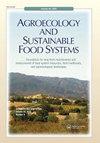生态农业减少气候影响的潜力:安达卢西亚传统食谱案例研究(西班牙)
IF 2.6
3区 农林科学
Q1 AGRICULTURE, MULTIDISCIPLINARY
引用次数: 0
摘要
通过实施以当地美食为基础的当地(情景 1,S1)、季节性(S2)、有机(S3)和高效烹饪(S4)膳食来扩大农业生态,可在改善人类健康方面发挥重要作用。本文章由计算机程序翻译,如有差异,请以英文原文为准。
Climate impact reduction potential of agroecology: a case study of traditional Andalusian recipes (Spain)
Scaling up agroecology through the implementation of local (Scenario 1, S1), seasonal (S2), organic (S3), and efficiently cooked (S4) diets based on local gastronomy can play an important role in r...
求助全文
通过发布文献求助,成功后即可免费获取论文全文。
去求助
来源期刊

Agroecology and Sustainable Food Systems
AGRICULTURE, MULTIDISCIPLINARY-GREEN & SUSTAINABLE SCIENCE & TECHNOLOGY
CiteScore
4.80
自引率
7.70%
发文量
73
期刊介绍:
Agroecology and Sustainable Food Systems is devoted to the rapidly emerging fields of agroecology and food system sustainability. By linking scientific inquiry and productive practice with transformative social action, agroecology provides a foundation for developing the alternative food systems of the future. The journal focuses on the changes that need to occur in the design and management of our food systems in order to balance natural resource use and environmental protection with the needs of production, economic viability, food security, and the social well-being of all people.
Agroecology and Sustainable Food Systems examines our current food systems from production to consumption, and the urgent need to transition to long-term sustainability. The journal promotes the study and application of agroecology for developing alternatives to the complex problems of resource depletion, environmental degradation, a narrowing of agrobiodiversity, continued world hunger, consolidation and industrialization of the food system, climate change, and the loss of farm land. The journal uses a food systems approach, and seeks experiences in agroecology that are on-farm, participatory, change-oriented, and backed by broad-based methodologies of sustainability analysis and evaluation.
 求助内容:
求助内容: 应助结果提醒方式:
应助结果提醒方式:


